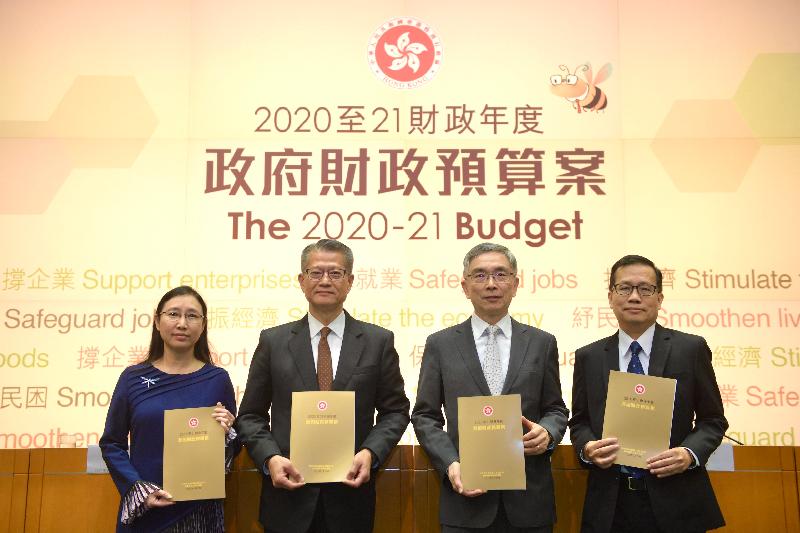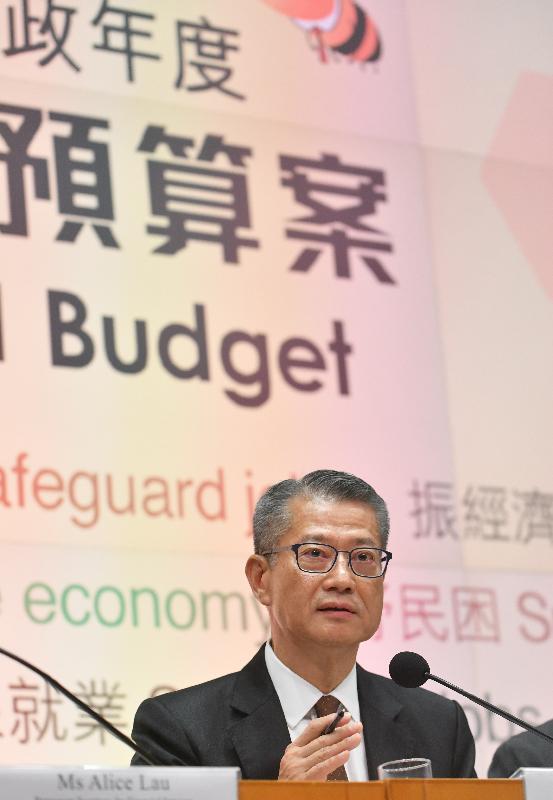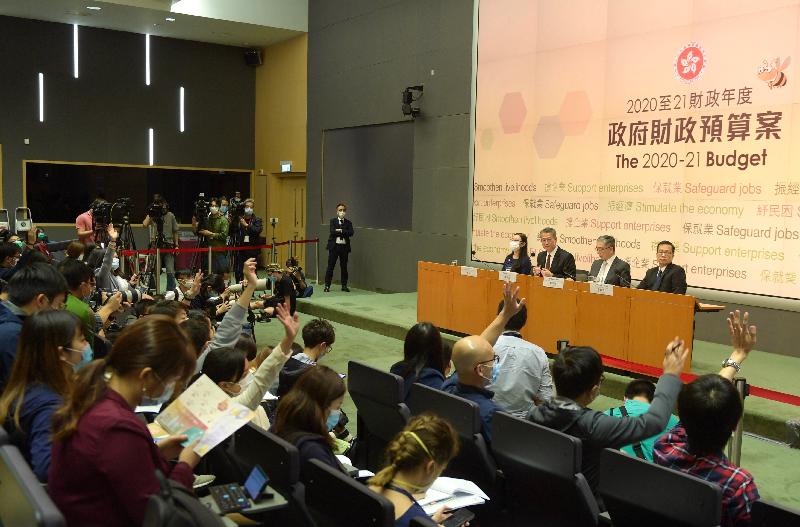Transcript of remarks by FS at Budget press conference (with photos/video)
**************************************************************************
Reporter: Mr Chan, I have three questions on your medium-range forecast. Number one is that you've forecast an annual deficit in the coming five years, but is the Government reluctant to really call it a structural deficit because it will affect Hong Kong’s credit rating? How confident are you that Hong Kong is not heading to a structural deficit? And you mentioned the Government’s innovation and technology policies will help generate more revenue, but how confident are you that Hong Kong will really take off in this area, because the city's already so much lagging behind other competitors like Shenzhen? Question number two is that, in paragraph 178, you mention that we may need to consider seeking new revenue sources or revising tax rates and one-off relief measures will also need to be reduced. Can you elaborate on that? What are your considerations? Would you consider, like, a higher profits tax rate? Would it affect Hong Kong's competitiveness? Or how about salary tax and Hong Kong’s tax base? Number three, you just now explained that the deficit, the 4.8 per cent deficit, but in terms of public spending, it also accounts for 22.6 per cent of Hong Kong's GDP in 2019-20 and while the reserve dropped to 15 to 16 months of government spending. Are these two worrying trends for you, and how will you cope with that in the future? Thank you.
Financial Secretary: On the annual deficit, if we look at the consolidated account, the deficit for the years after 2020-21, the following four years, the deficit will be in the order of about $10 billion-plus on average. In the context of a budget of about $600 billion, I would argue that it is kind of broadly balanced. And particularly 2020-21 is a very exceptional year. This is the first year we forecast a very conservative economic growth. At this stage, jumping into a conclusion of entering into a structural deficit may be too premature. That is my view.
As to your second question about innovation and technology, we are trying very hard to grow this particular sector. In the past few years, different policies have been launched – resources to the order of over HK$100 billion have been committed. The ecosystem for innovation and technology is getting more and more vibrant. We are confident that with this investment and with the determination and consistency in terms of government policy to promote this sector, we will be able to succeed. You mentioned about our competitive advantage vis-à-vis neighbouring cities like Shenzhen. The way we see it is that in the context of innovation and technology we have to leverage the synergy of all the cities within the Greater Bay Area. For Hong Kong, we have our own competitive advantage in terms of research capabilities, in terms of intellectual property right protection, things like that. In Shenzhen, they have a number of tech giants and they are very good in terms of transforming research findings into application, in terms of commercialisation and manufacturing. If we can work together and leverage on each other’s respective advantages, we can grow together, driving the Greater Bay Area into an international innovation and technology centre.
You mentioned about revenue, about tax rate. Yes, in face of the deficit in the operating account, we need to look into different ways of raising revenue. Adjusting tax rate is one option. Finding other revenue sources, having new types of tax is another. At this stage it would be premature for us to jump into the conclusion as to which one is the best or whether we should do a combination of both, but obviously this will be an agenda very high on our work.
Finally, in terms of fiscal reserves, although in the coming few years we are seeing over $50 billion annually in the operating account in terms of deficit, but on a consolidated basis, as I mentioned earlier, it is in the order of about $10 billion. If we take into consideration that figure, the fiscal reserve of the Government towards the end of 2024-25 would still be in the order of about $900 billion, which is about 15 months' government expenditure. Yes, in face of this situation we have to be vigilant. We need to think hard how to increase revenue, how to rationalise ourselves in terms of containing expenditure. But at this level I still maintain the view that the fiscal reserve at this stage is safe.
Reporter: … (inaudible) government spending at no more than 20% of GDP …
Financial Secretary: Ever since the year before last we already mentioned about breaking the threshold of government expenditure setting at no more than 20 per cent of GDP, because in a way, looking back, that constrained our social investment. In the past few years we have been spending a lot in terms of catching up in a lot of areas, like social services, education, and medical and health. But there is an extent to which we can do this, and when reaching a certain stage it would not be possible for us to continue increasing the expenditure like that. It is more important for us to make good use of the resources and the policies and do it properly so that with those resources we can enhance the service to the benefit of our people. But on the other hand, future increase in expenditure has to be commensurate with our increase in revenue. Thank you.
Reporter: Secretary, you mentioned that you are targeting this summer to give out the $10,000 but looking back in 2011 it was late October for the first batch of people could get the $6,000 back then, so what makes you so confident that you can be quicker than last time? The second question is about, do you think this measure, and your whole budget, by spending $120 billion as well as the cash handout as relief measures and so on, do you think this can actually help lift the very low popularity across the board for the ministers and also the Government, or is it actually not really going to help because according to the DAB if you are slow in giving the cash handout it would actually turn out to be a disaster rather than a thing that can help the popularity of the Government? Thank you.
Financial Secretary: In the last round back in 2011, when the $6,000 scheme was implemented, enrolment started in late August and payment was first made in November. So that was the enrolment day and payment day back then. This time, we are trying very hard to pull out all the stops. We are receiving great support from the Hong Kong Monetary Authority, the Office of Government Chief Information Office, the Treasury, the Post Office and other related departments. A task force has started to work on this particular project because we want to revive our economy, we want to stimulate consumption. It is important for us to be able to get this money into the hands of our people in summer when the current epidemic disease may be over. We are quite confident that we will be able to start payment in summer.
Reporter: But how can you be quicker than nine years ago? How can you be actually quicker?
Financial Secretary: Further details will be announced. I think in the past few years, electronic banking has become a lot more popular and also the use of electronic wallets and different fin-tech technology is more mature. I’m relying on my professional team to give me support in order to ensure a smooth implementation of this project.
Reporter: Sorry, the second question – popularity.
Financial Secretary: Sorry would you mind repeat, perhaps maybe because of the mask.
Reporter: Sorry, the DAB was saying that even if you give a cash handout, it might not help the popularity of the Government if you kinda mess it up, if you are slow in giving out the money. So my question is, do you think you are spending $120 billion and this $10,000 cash handout, is it actually going to help the very low popularity of the current government?
Financial Secretary: I think it is very important for us to do the right thing. Whether they help our popularity or not is irrelevant.
(Please also refer to the Chinese portion of the transcript.)
Ends/Wednesday, February 26, 2020
Issued at HKT 23:15
Issued at HKT 23:15
NNNN







